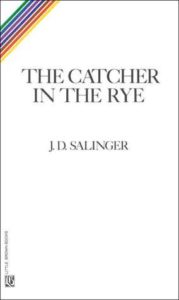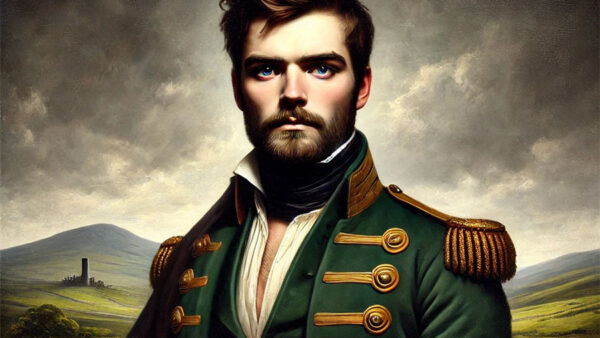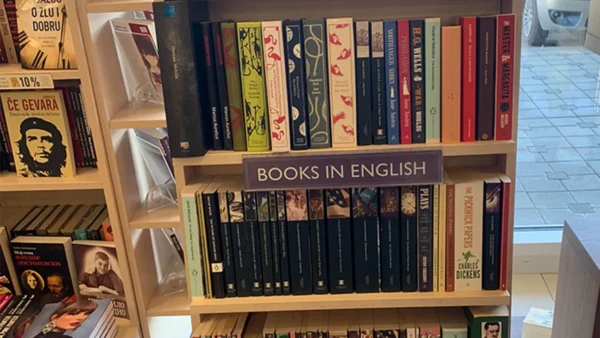 When I talked about why I blogged, I used to use this book as my stock example. Here I am in September 2008, for example:
When I talked about why I blogged, I used to use this book as my stock example. Here I am in September 2008, for example:
The original idea of this blog was to provide somewhere for me to record the books and articles I read. I forget things so easily: I know I’ve read “Catcher in the Rye”, for instance. I see it on my bookshelf sometimes, and the spine has creases. It’s definitely been read. But I can’t remember a single thing about it. Not one event, character, idea, sentence. Nothing. So my idea with this blog was to write things down.
Well, now I’ve re-read Catcher in the Rye, so I guess I’ll have to update my examples. It’s sad that it took me so long to come back to the book, and that it took the death of its author to prompt me. There really is a lot of good stuff in here.
What I found most amazing was that, although it was narrated by a self-pitying teenager with a lot of repeated verbal ticks, it never irritated me. It was just Holden Caulfield’s voice, and it felt authentic from the very first paragraph.
The other great achievement was to communicate a lot of ideas through the mind of a narrator who doesn’t have access to a lot of wisdom or perspective. He’s a teenager, and he’s grappling with feelings of alienation and revulsion, but doesn’t really understand why. Yet Salinger lets us understand more, partly by filling in back-story like the death of his little brother Allie, and partly by having adults speak to and about Holden, suggesting possible reasons for his position.
Holden is presented in some reviews as just an annoying, privileged kid who hates the world for no reason and should grow up and get over it. It’s easy to see why people would think that, but for me the story of Allie and his relationship with his little sister Phoebe give a much more interesting perspective on his character. Losing a brother is a horrible thing for any child to experience, and it seems to be the root of Holden’s hatred for the world. Allie died of leukemia at a young age and so is always preserved in Holden’s mind as a perfect, innocent child who went for walks with him in the park and wrote poetry on his baseball glove. Holden compares everyone else to this idealised picture of Allie, and it’s not surprising that he finds them all to be phony or dishonest. It’s also not surprising that he hates them, because they lived and Allie didn’t. He’s a child trying and failing to understand death and injustice. He holds the world up to impossible standards because in a way the people he meets have to prove why they deserve to live when Allie died. They, of course, fail to live up to his standards in various ways, and so he hates them.
Holden also fails, and he’s aware of it – he’s a coward himself, and phony sometimes, and he hates himself for it. He invites pain – the bloody nose from his school roommate, the roughing up from the elevator boy/pimp in the hotel, the cold in Central Park. He invites it perhaps because he feels he deserves it. Again, he’s comparing himself to Allie and finding himself wanting. Phoebe is the only person in the book he likes, because she’s still a child and so still innocent. He wants to protect her, to keep her frozen in childhood, a cute kid on a carousel. He hates the idea of her growing up and getting corrupted – when he goes to her school and sees someone has written “Fuck you” on the wall, he is furious and scrapes it off. Whenever he sees a child, it makes him happy – for him they are the symbol of purity in a dishonest world.
The title of the book ties all this together. When it’s first mentioned, on page 115, Holden is walking along Broadway feeling depressed as usual when he sees a young boy walking along the curb singing a song, “If a body catch a body coming through the rye”. The effect on him is instant: “It made me feel better. It made me feel not so depressed any more.” Then near the end of the book Holden is talking to Phoebe and she asks him what he wants to do in his life, and he can only think of one thing, based on the same song the boy was singing:
I keep picturing all these little kids playing some game in this big field of rye and all. Thousands of little kids, and nobody’s around – nobody big, I mean – except me. And I’m standing on the edge of some crazy cliff. What I have to do, I have to catch everybody if they start to go over the cliff – I mean if they’re running and they don’t look where they’re going I have to come out from somewhere and catch them. That’s all I’d do all day. I’d just be the catcher in the rye and all. I know it’s crazy, but that’s the only thing I’d really like to be. I know it’s crazy.
This is characteristic of the whole book – Holden doesn’t really understand, but expresses something in a confused way, and Salinger gives the reader enough information to understand and piece it all together. When you know about Allie, and see how Holden behaves around other children, this passage makes perfect sense. He wants to protect the children, and also to go back himself into a purer, happier time, before Allie’s death, before he started moving towards adulthood. He wants to catch them and preserve them as they are, happy and innocent, to save them from becoming adults or, worse, from becoming Holden Caulfield.



There are 8 comments
I have to admit that I’d never read Catcher in the Rye, until starting it this weekend. (I’m half way through.) It wasn’t part of our school curriculum here. In Canada we read authors such as Robertson Davies, W.O. Mitchell and Margaret Atwood – Americana was just never served up abundantly here in the school system. We’re a wee bit paranoid about losing our cultural identity to the US. (I think the barn door has already closed on THAT one nevertheless.) The book was always cloaked in conspiracy theories about government surveillance and all I ever heard about it was that is was last thing that John Lennon’s assassin was holding onto. (OK, I’ll stop with my excuses for not having read it until now.)
I’ll admit that I saw myself in the opening lines of your review. I was about to write Holden off as a self-absorbed teenager whose angsty vocabulary was limited to “moron”, “goddam” and “chrissakes.” But this line of your review made me reconsider my initial judgment:
“The other great achievement was to communicate a lot of ideas through the mind of a narrator who doesn’t have access to a lot of wisdom or perspective.” You’re right – he doesn’t have a lifetime of experience. If Salinger had given him that type of worldly wisdom, would Holden’s voice have been authentic and believable? Probably not.
I’m looking forward to reading the remainder this weekend.
Thanks for this thoughtful review. – G
I love this review, Andrew.
I only recently read Catcher and my plans for my blog’s read reflections would have consisted of a mere three sentences at most. I’m definitely going to link my review to yours (that’s if you don’t mind at all). You sum up the text pretty nicely and you’ve added great perspective to Holden’s character, personality and style of narration, all without explicitly going there. See, this post here puts my ‘disproving of dissatisfaction’ theory to work 🙂
Thanks Lucinda! Well, a couple of years have passed and already the memory of Catcher in the Rye is getting fainter! But this time I have the blog post to look back on. I enjoyed reading it again and remembering the book, so thanks for commenting.
And yes, of course I don’t mind you linking to it! I’m always happy to be linked to. Thanks!
Great! The post has already been drafted will publish it soon, it’s titled ‘madness and belonging’.
Thank you for the Evie Wyld book recommendation on the other comment article. Many of the books and authors I’d like to read are very difficult to find in South Africa, can be rather frustrating at times. But I’ll try my best.
Look forward to the post, Lucinda!
Have you tried https://www.bookdepository.com/? They offer free worldwide shipping, and stock pretty much all of the major UK and US books.
When this appeared for the first time, the American Government banned it. They feared that this book which showcased the agony of a teenager had the power to derail the fragile young minds of a nation into destructive paths. When I say the ‘agony’, it’s the true agony faced by a troubled teenager, not the namby-pamby and ridiculous and meaningless troubles with his opposite sex.
Holden Caulfield is deeply troubled. He’s alone, ambition-less, expelled from school. The story describes the events which ultimately lead to his breakdown. J D Salinger uses street language which enhances the realism of the character.
This is not a light read. Infact, though the story is about a teenager, this will be more appreciated by adults. And yes, a teenager who takes more notice of life and its comedies and tragedies and its drama than just the girl sitting beside him will be able to appreciate the book.
The book is timeless. Teenage angst, the ignorance and arrogance that resonate with anyone’s life during that time come to play and it’s this aspect which makes the book still relevant though it was first released in early 1950s. Though banned initially, the book years later, has been adopted by many schools across the West as part of their academics. Knowledge can sometimes aid as a medicine. This is perhaps used as a medicine for those kids who do not make a path to invest their energies in and rather succumb to petty troubles which take the appearance of nightmares in their teenage. This is an enlightening read.
Thanks for your perceptive comment, Amit. I agree, the book is still very relevant, and it’s interesting how perceptions of it have changed, from being banned to being a staple of school curricula. I think knowledge can definitely aid, and books like this can also help alienated young people to feel less alone. On the other hand, it’s also been the favourite book of people like the guy who killed John Lennon, which is perhaps what the government was afraid of 🙂 But on balance I agree that it’s better to have books out there for people to discover. I think people like Mark David Chapman would almost certainly have been on destructive paths without reading The Catcher in the Rye!